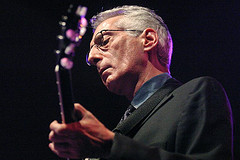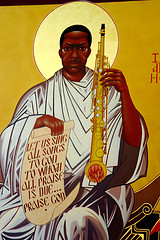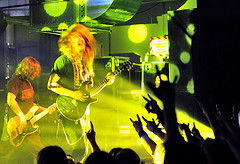Sep 29, 2011 Comments Off on Albert King, Live 1970
Albert King, Live 1970
Lately I’m entranced by the slashing wail of Albert King’s guitar playing.
What’s entrancing you of late?
Sep 29, 2011 Comments Off on Albert King, Live 1970
Lately I’m entranced by the slashing wail of Albert King’s guitar playing.
What’s entrancing you of late?
Sep 20, 2011 1
Back in the old days, if someone asked me what kind of music I liked, I would generally answer, “Jazz, rock, and classical.”
Jul 24, 2011 3
Inspired by Chuck Klostermann’s inspiring analysis of Led Zeppelin’s last performance at Knebworth. Thanks, Chuck.
1. Jimi Hendrix kicked off the last year of his life (1970) playing a series of shows at the Fillmore East with the Band of Gypsies. It is from one of these shows, recorded for posterity and released first as the album Band of Gypsies, that we have the definitive performance of his only overtly political song, “Machine Gun.” While the band played this song several times during their engagement, and Hendrix continued to play it until his death that September, this is the keeper:
2. When I was a kid, the off-handed political militancy of Jimi’s intro to this song was one thing that made it especially cool, even subversive and dangerous. Quoth Hendrix, “Happy New Year, first of all. I hope we have a million or two million more of them, if we can get over this summer [Foreshadowing!]. Ha, ha, ha. We’d like to dedicate this one to the draggin’ scene that’s going on: All the soldiers that are fighting in Chicago, Milwaukee, and New York. Oh, yes, and all the soldiers fighting in Vietnam. I’d like to do a thing called, ‘Machine Gun.'”
Now, Hendrix wasn’t particularly political and, if
May 24, 2011
1
“In 12 years, there have been 6 million dead men and women in Congo and 1.4 million people displaced. Hundreds and thousands of women and girls have been raped and tortured. Babies as young as 6 months, women as old as 80, their insides torn apart. What I witnessed in Congo has shattered and changed me forever. I will never be the same. None of us should ever be the same.” – Eve Ensler, May 2009 The World We Live In The situation Ensler describes above has only gotten worse and its “intractable” nature, documented by yet another report on the extent of sexual violence in Congo, led her to declare last week, “Here’s what I Am Over/400 thousand women getting raped a year in the Democratic Republic of Congo/48 women getting raped an hour/1,100 raped a day.” As she rightly points out, we live in a world that “… has allowed, continues to allow 400 thousand women, 23,00 women, or one woman to be raped anywhere, anytime of any day in the Congo.” Of course, we also live in a world in which Odd Future can release a song (“Swag Me Out,” from the Radical mixtape) containing the line (picked more or less at random), “”Nigga we/take a girl/rape her in the back/of the fucking jeep,” followed soon by, “Chop a bitch head off/Then get a pleasant nut off/Bitch!” In fact, in this world, the band can appear on Jimmy Fallon’s show and even have an interesting article written about them in the New Yorker. Read the rest of this entry »Odd Future in a World that Allows Rape
Jan 27, 2011 Comments Off on Lord, Give Us the Strength to Understand Ourselves
I set up a blog on Blogspot (now Blogger) back in 2000. I haven’t posted anything there since 2009 and, frankly, my activity on said blog—universal destroyer, inc.—was pretty spotty. For example, I posted nothing at all in 2004 or 2005, bracketing this lack with six posts in ’03 and four in ’06.
I was re-reading my posts last night and was struck by several things, chief among them that I used to indulge in a highly poetical style of writing. For example:
formidable jaws gaping wide – who will clean these teeth? lambswool clotted with blood, crown and throne up-ended and shattered. a blizzard of flaming stones, a sea of ground glass. take a step. take a breath. the eyes are open. the ears are listening. what subtle words of destruction and awesome commandments of revelation await? turn away the curve of the earth. peel away the sun. behind the underneath of everything it is slumbering now. it is dreaming then. now: AWAKEN
Similarly:
plastered to the thick of it. daring to blush in anguish. several more instances of that and we will have an entire catalog. just think, us, we, the morning after the apocalypse, which everyone thinks means death and dying destruction, but, of course, the word simply means “revelation.” what do we fear to confront revealed before us? the veil rent, the bandaid removed with a quick, skin-shredding yank? as if this situation were not “real” and, when facing the brunt of the real real, we will evaporate, obliterated by this uncompromising, uncompromised force. who told us the world is not real and we have to wait and see the real thing later, after death, when the universal death leaps up onto the stage and everything be laid terrible waste? who makes brains think this way?
I was also very partial to cryptic philosophizing:
The “Temporary Autonomous Zone,” however, may be the last refuge of the slacker – or merely the dream of the quiet suburban home where anything goes as long as the doors are closed and the shades drawn (and volume is kept to reasonable levels). As the structures solidify, the gaps too become institutionalized, disciplined. Anything completely outside the system, is irrelevant to it. Think different.
Along the same lines:
The forces of chaos can only be circumscribed – no thing or agent penetrates to the heart, because, unlike order, chaos is primal, the fundamental state – order is an afterthought, epiphenomenal, and the evolving persistence of chaos demands ever increasing energy expenditure on the part of the order-worshippers. Their scheme is a house of cards. The meanings they erect are fetishes to the ego and vain ambitions. There are local victories, of course, subjugated zones, degrees of tolerance. And, naturally, what has been done, will always have been done – this is the nature of occurence. But the goal to which they aspire – permanent, unassailable control – is an illusion, though it can be real enough in specific, timebound circumstances.
Indeed, I frequently wrote about chaos, ethics, and nihilism back then, as well as the war on terror (particularly in 2002 when I was blogging most actively and the war was new, not something that had been grinding on for a decade). I also wrote about music, sometimes like this (written, if I’m not mistaken, about Meshell Ndegeocello):
and reminded yesterday in the presence of an androgynous funk sorceress of the power of music. this is materialist mysticism. no gods. no beyond. no elsewhere. music, generated and evaporated in the flux of time. that we can spend our time this way, dancing, playing. and every religion on earth a construct, a convention. “would you walk the path of righteousness if you knew that there was no heaven, no god, no eternal reward?” many would hesitate; many more would simply walk the path, realizing that that too is one way to live here on earth, to reenact the dramas of faith, the carnival of belief. not believing is possible as well. knowing is possible. not knowing, also. but a bunch of humans together under the spell of music, the energy focused and broadcast through one particularly active node, nodding, funking, precipitating the flow. we’re in it too.
And once like this:
“war is their reality; music is their escape.” saw this on the side of a train this morning advertising some show about people in the military (the “service,” as it is called – they always say that soldiers “serve,” rather than “obey”). picture of a soldier with headphones pressed to his helmet. many consider music an escape, though, more accurately I suppose, you’d have to say that music is an “avenue of escape” or a “line of flight” [deleuze/guattari]. we escape through music to somewhere else. where is that place? different musics describe/conjure up different places/spaces. trungpa rinpoche wrote, “true escape is impossible.” that is, the escape afforded by music is a false escape. why? because it is stationary, insular, solipsistic. “in my head” [black flag] the statement should be reversed: “music is their reality. war is their escape.” music takes place in our heads, a construct of our minds. it is an escape only in the sense that sleep or dreaming is an escape. war, on the other hand, takes place “out there” in the world. in fact, it consists primarily of conquering and occupying territory, contesting or maintaining geographical boundaries, enforcing or preventing specific physical movements by actual human bodies. war takes us outside of our heads; it explodes heads (the true seat of music). war also sets aside every convention and expectation of civil society (the real reality for many). war frees the warrior, the soldier, from the inhibitions and codes of this society, in fact, often demands that he leave them behind in order to triumph in victory. in this sense, it is an escape, and its idolators have often celebrated it as a return to the origin, the essence, to reality in its realest sense, a liberation from the false fetters of civilian life. of course, there has always been a specific music of war and, in fact, the regimented beats of popular music are derived from the martial beats of war. so, in this sense, the reality of music is war and, again, it provides no real escape from it (since, at its core, it is an expression/extension of it). etc….
And where did this walk down memory lane lead me? First to the insight that some things haven’t changed much. I am still obsessed with music, metaphysics (“Why is there anything at all instead of just nothing?”), and ethics in a world without God. On the other hand, my thoughts dwell less and less on chaos, war (for the time being), and political paranoia.
Secondly, and this is sort of what this post is about, it pointed out to me how much I can forget about myself, about both what I have written over time (and I’ve been writing regularly and obsessively for more than 25 years) and how I have written. My style is tighter now, more focused (at times), and far less likely to veer off into the oracular. Remembering this latter tendency, however, I can’t help but feel its absence as a kind of loss.
The web is a memory bank. It remembers what we have forgotten, regardless of whether that forgetting was intentional or just the way things go. For this reason it can serve as a powerful tool for self-reflection and, when we’re lucky, illumination.
Of course, it also means that the web may be the only thing that remembers us after we’re gone. Indeed, to the extent that our web-published musings go unread and unnoticed, it may be the only thing that remembers us now.
PS. For the curious, the title of my post comes from the amazing Funkadelic piece, “March to the Witch’s Castle.” That song is about soldiers returning from Vietnam but also addresses the broader human problem of self-awareness in the face of trauma and time’s passing.
Oct 8, 2010 Comments Off on Mahler’s 2nd Symphony, BSO, October 7, 2010
Got to see James Levine get back in the saddle and ride Mahler’s sprawling warhorse into the sunset last night. It was amazingly beautiful and there were times, especially during the first movement, when I thought, “Is this the most incredible music every written or conceived by any human?”
I was awe-struck by Mahler’s unending melodic inventiveness, his mastery of independent harmonic and rhythmic motion, and that insane chord which verily shreds the fabric of sanity and reality in the third and fifth movements.
I was furthermore impressed by, among other things too numerous to enumerate, the ominous and almost menacingly hushed entrance of the choir in the later stages of this dazzling and confounding masterpiece.
There may have been flaws in the execution (at least the Globe thought so) and the sheer volume towards the end was too much for my aging ears, but, all in all, I found this performance sublime and cathartic.
Plus, driving to and from the concert my car radio provided the following musical bookends: Kiss’ “Detroit Rock City” (driving in) and ELO’s “Fire on High” (driving home). Sweet.
Sep 15, 2010 3
 I went to see Rush at the Garden last night. It was good, but it wasn’t sublime.
I went to see Rush at the Garden last night. It was good, but it wasn’t sublime.
Here’s the thing. I’ve liked Rush since I was a kid and in fact still listen to their music with an, for some, alarming frequency (my favorite album being Fly by Night). However, I never really explored their catalog, which I otherwise celebrate, beyond Moving Pictures, the mega-hit which sold over 4 million copies worldwide and put them on the classic rock map for good.
If I think of things from the standpoint of Geddy, Alex, and Neil, I realize that for them, Rush is everything they have done since they started playing together in something like 1968. In fact, early on in the show Geddy Lee joked that they had “400 songs” that they could play for us.
Unfortunately, for many of my generation—I recently turned 47—Rush actually boils down to the 4 or 5 songs (“Tom Sawyer,” “Limelight,” etc.) that we’ve heard a thousand times and, if you are a semi-fan like me, choice cuts from the preceding albums (“Xanadu” from A Farewell to Kings or “The Necromancer” from Caress of Steel). Aside from “Subdivisions” off Signals, I couldn’t really name a Rush song recorded after 1980.
It was for this reason, and a couple others, that the first lengthy set Rush played was a bit of the hard slog. Kicking things off with a very corny, though highly produced, film clip that set up the “time machine” theme of the evening, the band launched into one of their biggest hits, “Spirit of the Radio,” and it was exhilarating. When you hear a band play a song that has been kicking around your ears for thirty years it is undeniably powerful and I was, for about 4 minutes and 50 seconds, transported. Read the rest of this entry »
May 15, 2010 6
 Caught Pat Martino’s first set at Scullers last night. He was playing with organist Tony Monaco and drummer Jason Brown and confirmed note-by-sinewy-note his well-deserved status as a living master still very much in possession of his prodigious gifts.
Caught Pat Martino’s first set at Scullers last night. He was playing with organist Tony Monaco and drummer Jason Brown and confirmed note-by-sinewy-note his well-deserved status as a living master still very much in possession of his prodigious gifts.
Martino’s patented “horn-like” lines were in full display, as was his aptly groovy and well nigh gut-bucket comping, while his dynamic phrasing added a sublimely meta-rhythmic layer to all the serpentine spideriness of his “concept.”
One thing that separates Martino from the be-boppers and modernists who preceded him (the Jimmy Raneys and Jim Halls of the world) and the post-modern post-fusionists of today (from Scofield to Rosenwinkel) is that he’s got a healthy dose of the Sixties on him. This shines through in his come-by-it-honestly nativist approach to the funky organ trio setting as well as in his trance-inducing, raga-esque vorticism (which reminded me, at times, of my longtime idol, Gabor Szabo).
In other words, Martino was great.
Nevertheless, for me, the true star of the evening was Tony Monaco. A highly animated and expressive guy (his protean facial expressions were themselves worth the price of admission), he played astoundingly well, moving fluidly from vintage Jimmy Smithery to an ELP-like psychedelia. The neck-deep in the reverb, quasi-soap-opera tone he chose during “Alone Together,” which he rode deep into an obscure, supersonic well, was emblematic of his adventurous, effervescent, and endlessly captivating style. We haven’t heard the last from Mr. Monaco.
The evening’s one moment of strangeness was when Pat temporarily dismissed the band and invited his wife, Ayako, to play a couple numbers with him. I couldn’t get my head around that move until I thought, “This guy has basically been on the road for 45 years and, at this point, the stage is more or less his living room. Why shouldn’t he just sit down with his wife and play a couple tunes for friends?”
Except, of course, the stage is not a living room and we are not his friends, which made this portion of the show either eccentric, endearing, or irritating, depending on where you were at mentally.
Image Credit: tom.beetz
Jun 19, 2009 Comments Off on Coltrane and the Face of God
 Listening to Coltrane’s Settin’ the Pace. It’s not one of his greatest hits and even the various jazz cd review books give it second tier status, but I really enjoy it. “I See Your Face Before Me” is the lead track, an exquisite ballad that I humbly believe outshines the more famous “I Want to Talk About You” from Soultrane.
Listening to Coltrane’s Settin’ the Pace. It’s not one of his greatest hits and even the various jazz cd review books give it second tier status, but I really enjoy it. “I See Your Face Before Me” is the lead track, an exquisite ballad that I humbly believe outshines the more famous “I Want to Talk About You” from Soultrane.
Still, saying this or that by Coltrane is better than this or that by Coltrane seems trivial and, frankly, beside the point (much like I found Ben Ratliff’s book on Coltrane’s sound). These are just opinions, after all, and vanity, moreover. Who cares what you/I think about any particular work by this man? It’s a mixture of hero-worship and elevation-by-association that frankly demeans the opiner by revealing a lamentable failure to listen.
I read an interview with Matisyahu once in which he pointed to the number of love songs out there as an indication of how much people are yearning for the love of God. “People feel abandoned by God, they feel alone. You see by the number of love songs there are, it’s a proof of that,” he said.
Coltrane’s devotion to God causes me to hear in his ballads blessed celebration and the joy of reunion. The face he sees before him, is the face of God. The “you” he wants to talk about is You, My Lord.
Image Courtesy of Flykr.
May 6, 2009 1
Learn from the mystics is my only advice. – Roxy Music [misheard]
 A friend suggested that I write a review of the Opeth show I attended on Saturday, May 2, 2009. I find myself quite incapable of doing so because, frankly, I cannot judge their music objectively or provide an accurate recounting of their performance.
A friend suggested that I write a review of the Opeth show I attended on Saturday, May 2, 2009. I find myself quite incapable of doing so because, frankly, I cannot judge their music objectively or provide an accurate recounting of their performance.
This inability stems from the fact that my experience of Opeth was not primarily aesthetic in nature. Rather, as has been the case with the best metal shows I have attended, my experience in the presence of these masters of the art tended more towards the mystical/ecstatic realms of human consciousness.
Indeed, my most immediate memory of the show finds me in a state of frenetic, possessed movement accompanied by an ego-annihilating oceanic feeling. I give Opeth credit for inducing this state, a thing they accomplished via a sometimes subtly, sometimes savagely evolving rhythmic intensity coupled with serpentine melodies, strange words, and the trance-inducing repetition of droney, modal patterns.
Through its deliberate and complex structures – not to mention the aggressive amplification of sound and hypnotic manipulation of light – Opeth’s music invited the listener to become lost in its labyrinth.
However, it was not an all-devouring minotaur that awaited it us at the center of these intricate and winding passages. It was, instead, a refreshing, liberating, and, dare I say, “communal,” transcendence.
For all who seek the fortuitous and often unexpected profane illumination sometimes afforded by the marriage of technology and spirit in this post-everything age, I recommend that you seek out Opeth and especially the public display of their conjurings.
Image Courtesy of deep_schismic.